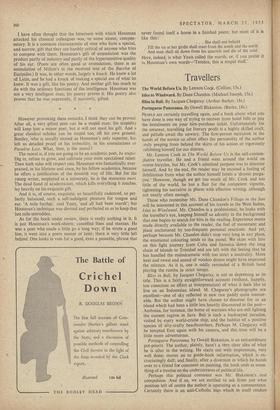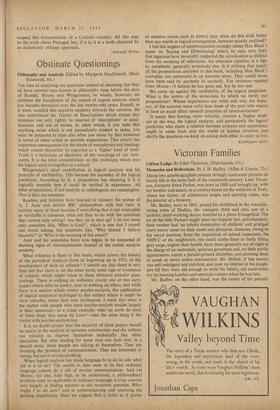Travellers
PEOPLE are certainly travelling again, and a book about what you have done is one way of trying to recover from hotel bills or pay the instalments on your hire-purchase ticket. Unfortunately for the amateur, travelling for literary profit is a highly skilled craft, and pitfalls await the unwary. The first-person narration in the hands of the novice so often offers the personality of the author oyly peeping from behind the skirts of his action or vigorously exhibiting himself for our distress.
Mr. Lennox Cook in The World Before Us is the self-contem- plative traveller. He and a friend went around the world on motor-bicycles, but Mr. Cook's admitted purpose was to discover himself. And by the end, the reader may be excused a feeling of debilitation from what the author himself labels a 'drastic purga- tive.' However, though we get too much of Mr. Cook and too little of the world, he has a flair for the competent vignette, tightening his narrative in places with effective writing, although not nearly often enough.
Those who remember Mr. Dane Chandos's Village in the Sun will be interested in this account of his travels in the West Indies, Isles to Windward. Mr. Chandos is a professional; he looks with the traveller's eye, keeping himself so adroitly in the background that one begins to search for him in the reading. Experience seems made directly available to the reader, the feel of movement and place uncluttered by too-frequent personal reactions. And yet, perhaps because Mr. Chandos didn't stop very long in any place, the emotional colouring tends to the pastel. We skim with him on this light journey from Cuba and Jamaica down the long chain of islands to Trinidad and are left with the feeling that he has handled the melodramatic with too strict a neutrality. More heat and sweat and sound of voodoo drums might have improved the mixture. As it is, one is oddly reminded of a British band playing the rumba in strict tempo.
Bliss in Bali, by Jacques Chegaray, is not as depressing as its title. This is a fairly straightforward account (without, happily, too conscious an effort at interpretation) of what it feels like to live on an Indonesian island. M. Chegaray's photographs are excellent—one of sky reflected in new rice paddy quite memor- able. But the author might have chosen to discover for us an island which had been a little less heavily discovered in the past- Amboina, for instance, the home of warriors who are still fighting the current regime in Java. Bali is such a hackneyed paradise, visited by every world-cruise ship, and the habitat of a positive species of arty-crafty beachcombers. Perhaps M. Chegaray will be tempted East again with his camera, and this time will be a little more adventurous.
Portuguese Panorama, by Oswell Blakeston, is an extraordinary pot-pourri. The author, plainly, hasn't a very clear idea of what he is after in the writing. He starts out with impressions, very well done; moves on to guide-book information, which is ex- cruciatingly dull; and finally, after a diversion in which he hands over to a friend for comment on painting, the book ends as some- thing of a treatise on the undercurrents of political life.
Perhaps this political comment was Mr. Blakeston's real compulsion. And if so, we are entitled to ask from just what position left of centre the author is operating as a commentator. Certainly there is ;in anti-Catholic bias which in itself renders suspect this interpretation of a Catholic country. All this may be the truth abont Portugal, but, if it is, it is a truth obscured by an elaborately oblique approach.
OSWALD WYND



































 Previous page
Previous page